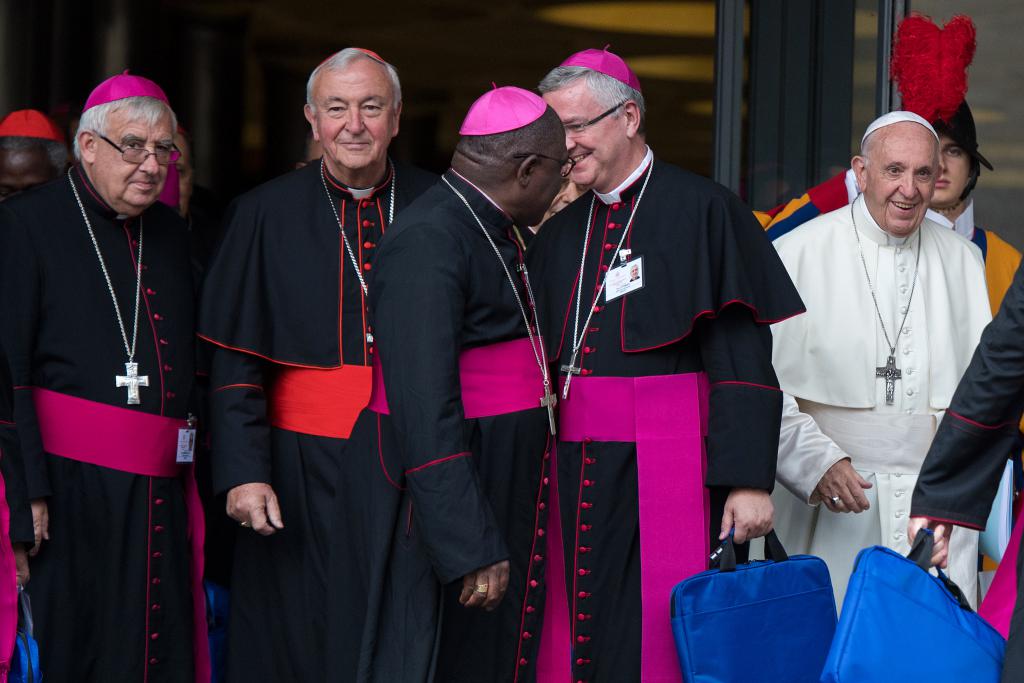In the second week of the Synod on Youth, Faith and Vocational Discernment, Cardinal Vincent reflected on the plenary discussions about the second theme.
In this part, we’ve been trying to look more deeply at the reality in front of us and to discuss the Church’s response to it.
There have been some marvellous debates, full of energy and actually full of fun. Some of the key words that have really emerged in my hearing have been the theme of joy. In the synod hall, there’s a good group of young people; their enthusiasm and joy is infectious. There’s energy, but there’s been a lot of talk about joy.
Some of it has come from a deeper sense of what vocation means. What does it mean in our human existence. A key thought has been that the essential vocation of every human being is to love because it’s only in love that we flower as people and that we make touch with lasting, faithful, trusting touch with the other. In this call to love, there are at least two aspects: One aspect is that we reach out for something that we perceive as being for our fulfilment; and then, as we grasp that, as it comes into our life, there’s a passion that bursts out in us. There’s something that we want, that we want to tell people about, something that we know is fulfilling us. Then out of that energy and flowering comes a desire to give, to give in return. And so, these two aspects of vocation, vocation to love, are on the one hand self-fulfilment and on the other hand self-gift. These reflections help us to deepen our appreciation of what we mean when we say ‘vocation’.
There has been a lot of talk about discernment. At its simplest, there are two key discernments. On one level, we have to discern what I really need and what really I don’t need, so that we begin to discern what the priorities are in life. Along with that and tied to it is another discernment of what is good for us and what is not good for us. All of these things come into a much sharper focus when they’re put in the context of faith, with the eyes of faith. That person that we reach out for, for our fulfilment has a name: it’s the name of Jesus. And the gift that we want to share with other people is the gift of our faith. And the discernment between what is good for us and what is not good for us is in response to this question: Will this lead me closer to God? This is discernment and conscience trying to understand the presence of God in my life.
Young people have told us how much they want to be in the presence of those who have made these choices and, as it were, have a pathway of life, especially, they say, the presence of a priest. How much we desire your presence, is what they’re saying to us. I think that has tremendous resonance for everybody who’s taking part in this synod.
And then also in this whole process of discernment, there’s been focus on the importance of spending time in the presence of the Lord, especially in Adoration of the Blessed Sacrament and at Mass.
There was a lovely talk given by a priest from the Philippines, who said he wanted to reinterpret what he hears. He said: ‘I meet with young people and a lot of me senses that on the outside there are smiles and on the inside there are tears.’ He said: ‘I try to understand this more deeply: where their fragility comes from and where their hope is born as well.’ He said, ‘when I ask people what do they really want, what are those deepest desires?’ One lad said to him: ‘Look, I only have one life. I really want to live life fully.’ Then he thought of those words of Jesus: ‘I have come that you may have life, and have it to the full.’
These are just some of our themes from this week. Now we go into our small groups to look at them in more detail and to look at texts. Then eventually we will focus on the third part, which is a deeper consideration of the response that we need to give to all of these things that we’ve been pondering.
Photo: Mazur/Catholicnews.org.uk




